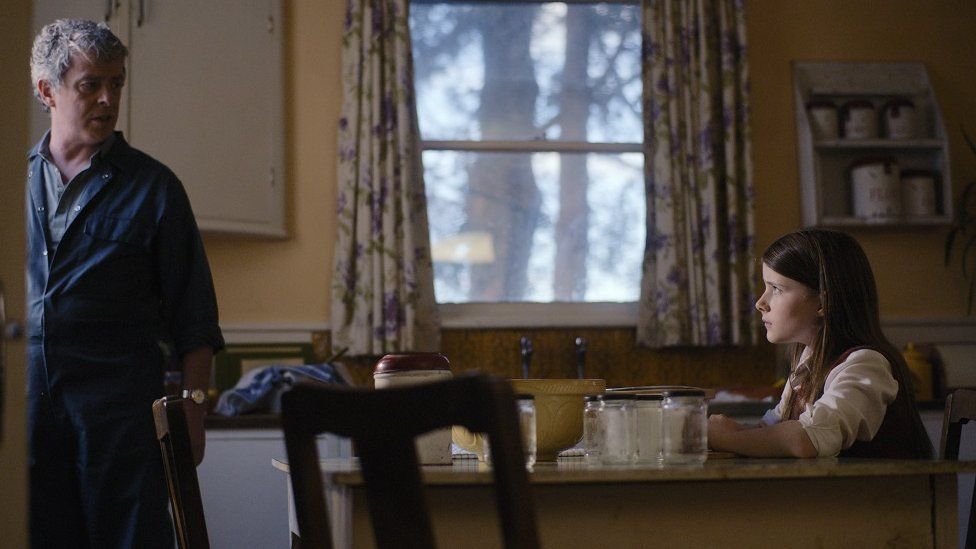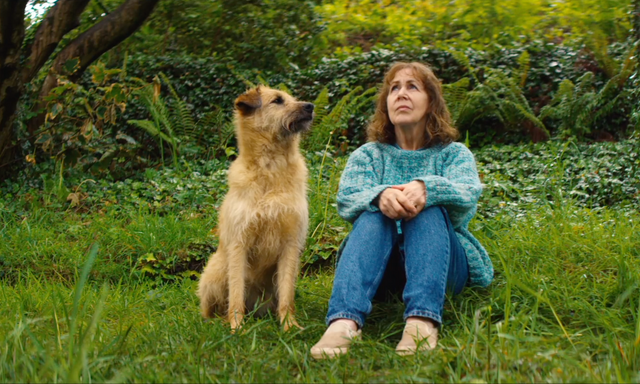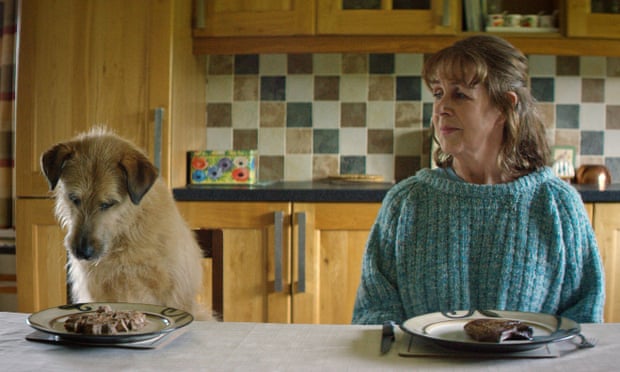Is maith liom dul go dtí an phictuirlann. Tá mé freisin ag foghlaim Gaeilge san obair. Mar sin de, chuaigh me chuig na dhá scannáin Gaeilge An Cailín Ciúin agus Róise & Frank. If you don't live in Ireland then An Cailín Ciúin is the one of these you are most likely to have heard of, though you will probably have heard of it under its English title, The Quiet Girl. Written and directed by Colm Bairéad, it is a finalist in this year's Academy Awards in the Best International Film category and is based on Foster, a novella by Claire Keegan. The eponymous girl is a child of neglect, her father a deadbeat piece of shit from central casting (so well played by Michael Patric that I can imagine the actor having to wear a paper bag over his head to prevent random strangers hurling abuse at him when he is out in public) and her mother completely ground down and mired in the slough of despond.
 But then she goes on an extended stay with distant relatives (an older and apparently childless couple, the woman warm and affectionate, the man initially more gruff and reserved) and experiences the kind of parental affection hitherto denied to her. We learn things and so do the characters, but not in a "And you have learned how to make a good bagel!" kind of way. It's all pretty subtle, with many things remaining unspoken or implied. But it puts you through the emotional wringer, not least because there is no Hollywood transformation in the film's end; he viewer left wondering how the poor girl's childhood and life pans out, with various non-ideal outcomes looking entirely possible. The three central actors (Catherine Clinch as the girl and Carrie Crowley and Andrew Bennett as the fosters) give incredible performances and it is hard not to recommend this film. My beloved did however feel that the girl is a bit talkative for someone supposedly defined by her quietness.
But then she goes on an extended stay with distant relatives (an older and apparently childless couple, the woman warm and affectionate, the man initially more gruff and reserved) and experiences the kind of parental affection hitherto denied to her. We learn things and so do the characters, but not in a "And you have learned how to make a good bagel!" kind of way. It's all pretty subtle, with many things remaining unspoken or implied. But it puts you through the emotional wringer, not least because there is no Hollywood transformation in the film's end; he viewer left wondering how the poor girl's childhood and life pans out, with various non-ideal outcomes looking entirely possible. The three central actors (Catherine Clinch as the girl and Carrie Crowley and Andrew Bennett as the fosters) give incredible performances and it is hard not to recommend this film. My beloved did however feel that the girl is a bit talkative for someone supposedly defined by her quietness.
Rachael Moriarty and Peter Murphy's Róise & Frank meanwhile is about a widow who is struggling to deal with her grief when a mysterious dog shows up at her house and refuses to go away. Soon she realises (or concludes) that the dog is in fact the reincarnation of Frank, her late husband. Frank was a keen hurler in his human life and the dog too shows an affinity for the noble sport, soon helping a local school team to advance to the finals (he does not actually play in the games, because that would be insane, but he helps with coaching). Róise's son is less convinced that the dog is his late father returned, but he cannot deny the positive transformation "Frank" has wrought on his mother.
 It would be easy to dismiss Róise & Frank as a kitsch feelgood film, but I think there is more to it than that. There are some deeply moving scenes in it and I think the film will resonate with anyone who has ever lost a loved one or suspects that they may do so at some point in the future. It is also worth reporting that "Frank" is a very good dog. He is played by Barley, an English dog who had to learn Irish for the film. He appears to have greatly enjoyed making Róise & Frank, as he got to eat a lot of sausages and even some steak (I can imagine him deliberately fluffing some of the dining scenes as a way of getting more sausages in the re-take). The human actors (Bríd ní Neachtain as Róise and Ruadhán de Faoite as the main kid hurler are also pretty memorable, as is Lorcan Cranitch as the neighbour who resents the arrival of "Frank" as a blocker on his making moves on Róise).
It would be easy to dismiss Róise & Frank as a kitsch feelgood film, but I think there is more to it than that. There are some deeply moving scenes in it and I think the film will resonate with anyone who has ever lost a loved one or suspects that they may do so at some point in the future. It is also worth reporting that "Frank" is a very good dog. He is played by Barley, an English dog who had to learn Irish for the film. He appears to have greatly enjoyed making Róise & Frank, as he got to eat a lot of sausages and even some steak (I can imagine him deliberately fluffing some of the dining scenes as a way of getting more sausages in the re-take). The human actors (Bríd ní Neachtain as Róise and Ruadhán de Faoite as the main kid hurler are also pretty memorable, as is Lorcan Cranitch as the neighbour who resents the arrival of "Frank" as a blocker on his making moves on Róise).
 Interestingly, both of these films are (mostly) set in the same part of the country, the Ring Gaeltacht in County Waterford. In both cases I think the choice is fairly deliberate. When most people in Ireland think of Irish speaking parts of the country they imagine bleak windswept places in the west of Ireland, but setting films there means the landscape takes over the story and you start having to deal with themes of isolation and remoteness, together with an association of the Irish language with being far away from modernity. Ring is a mostly rural area but in neither of these films does it look like a land that time forgot or somewhere that remained Irish-speaking because it was too far away from the centre of imperial power and too poor to be worth bothering with. So that lets the stories of the films speak for themselves: these are films in which the characters speak Irish but they are not really films about the Irish language.
Interestingly, both of these films are (mostly) set in the same part of the country, the Ring Gaeltacht in County Waterford. In both cases I think the choice is fairly deliberate. When most people in Ireland think of Irish speaking parts of the country they imagine bleak windswept places in the west of Ireland, but setting films there means the landscape takes over the story and you start having to deal with themes of isolation and remoteness, together with an association of the Irish language with being far away from modernity. Ring is a mostly rural area but in neither of these films does it look like a land that time forgot or somewhere that remained Irish-speaking because it was too far away from the centre of imperial power and too poor to be worth bothering with. So that lets the stories of the films speak for themselves: these are films in which the characters speak Irish but they are not really films about the Irish language.
íomhanna
Catherine Clinch agus Carrie Crowley san Cailín Ciúin (Meath Chronicle: "An Cailín Ciúin breaks box office records")
Andrew Bennett agus Catherine Clinch san Cailín Ciúin (BBC News: "An Cailín Ciúin: Irish language film shortlisted for an Oscar")
Barley agus Bríd ní Neachtain san Róise & Frank (Entertainment.ie: "Róise & Frank is anything but a dog's dinner")
Barley agus Bríd ní Neachtain san Róise & Frank (The Guardian: "Róise & Frank review – a shaggy-dog story with easy Irish charm")
Barley ag foghlaim a línte Facebook: Róise & Frank)

No comments:
Post a Comment